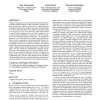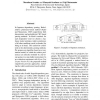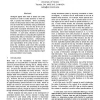674 search results - page 53 / 135 » Preferences in Game Logics |
EATCS
2000
13 years 9 months ago
2000
Formulas of Hoare logic are asserted programs where is a program and , are assertions. The language of programs varies; in the survey [Apt 1980], one finds the language of wh...
ATAL
2009
Springer
14 years 3 months ago
2009
Springer
Weighted voting games are a natural and practically important class of simple coalitional games, in which each agent is assigned a numeric weight, and a coalition is deemed to be ...
ESWS
2007
Springer
14 years 3 months ago
2007
Springer
In this paper we propose an approach to semantic matchmaking that exploits various knowledge representation technologies to find most promising partners in peer-to-peer e-marketpl...
COLING
2008
13 years 10 months ago
2008
In Japanese dependency parsing, Kudo's relative preference-based method (Kudo and Matsumoto, 2005) outperforms both deterministic and probabilistic CKY-based parsing methods....
IJCAI
2003
13 years 10 months ago
2003
Intelligent agents often need to assess user utility functions in order to make decisions on their behalf, or predict their behavior. When uncertainty exists over the precise natu...



